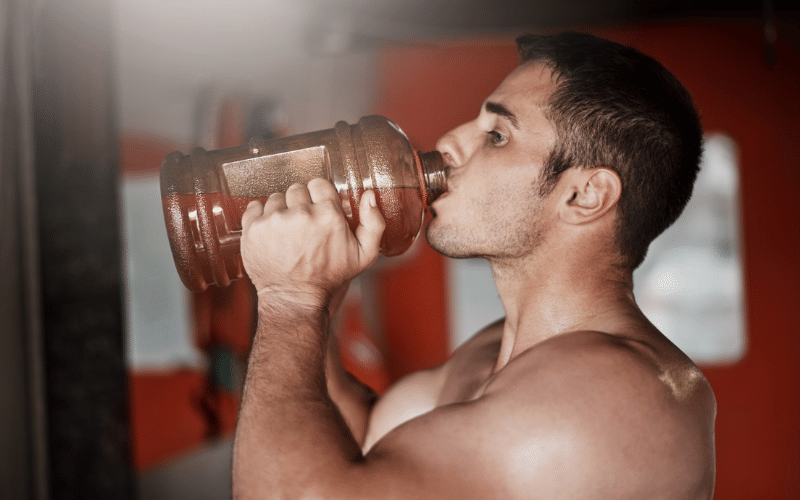Table of Contents

Many beginning lifters ask, can you take creatine with pre-workout drinks. Have you ever been curious about creatine, but didn’t want to take the time to research it? Well, now you can!
There are a number of different ways to take creatine with pre-workout. Here we will summarize the best ways to take creatine with pre-workout, so you can make the most informed decision.
What is Creatine?
Creatine is a compound naturally found in the body that produce adenosine triphosphate (ATP)[1]. When used as a supplement, creatine can increase muscle mass and strength.
Can You Take Creatine with Pre-Workout
One problem with consuming creatine powder with pre-workout is that it can be difficult to mix. This means that your pre-workout will often end up gritty or gritty-looking.
If you’re using a supplement designed to combine with Creatine Monohydrate, then this shouldn’t be an issue.
Another problem with including creatine powder in your pre-workout blend is that it may cause stomach cramps or diarrhea.
This usually isn’t a huge deal if you’re drinking water before and after taking your drink, but can be a major issue if you are not hydrating enough.
So, it’s important to keep this in mind when deciding whether or not to include creatine powder in your pre-workout drinks.
How to Take It?
Creatine is a compound that is able to increase muscle mass. It does this by allowing for the extraction of adenosine triphosphate (ATP), which is an energy-rich compound.
When ATP is stored, it helps with muscle growth and repair. It allows for greater energy production and better maintenance of muscle cells.
There are a few different ways to take creatine with pre-workout:
1) As a pill
2) In capsules
3) In liquid form
4) In powder form
5) In a shake
6) From food or drink
What Are the Benefits of Taking Creatine?
Creatine is synthesized in the liver and kidneys and is stored in bodily tissue. Creatine allows for the production of ATP, which assists with energy production. There are two ways to take creatine: as a dietary supplement or during exercise.
Creatine has been shown to increase muscle mass and strength. It also improves athletic performance, reduce body fat, and improve mental function.
In fact, one study showed that creatine supplementation increased memory capacity—a key factor in your overall brain health.
When taken as a supplement, creatine has no known side effects; however taking it during exercise can cause some minor gastrointestinal discomfort from cramping or diarrhea.
Because of this, most people prefer taking it as a supplement because they don’t have to worry about any risks associated with exercise-induced sicknesses or dehydration.
Creatine doesn’t result in fat gain because it prevents the loss of water weight through sweat during intense activity like sprinting or lifting weights. This also helps you maintain muscle mass while losing fat due to exercise.
Best Ways to Take Creatine with Pre-Workout?
Creatine is a compound that improves your muscle performance. It works by providing energy to the muscle cells and increasing the amount of ATP produced. Creatine is best taken with pre-workout, as it is absorbed quicker when taken this way.
Creatine is available in three forms: creatine monohydrate, creatine ethyl ester, and creatine HCL. While all forms have shown to increase performance and strength, we will discuss the effects of each type of creatine.
Creatine Monohydrate
This form of creatine has been widely studied, and studies have found that it increases power output by 4% depending on the individual’s body weight.
The most common side effect associated with monohydrate is stomach discomfort. You can avoid this by taking a loading dose for 5 days before starting regular consumption.
Creatine Ethyl Ester
This form of creatine increases power output by 12%. Ethyl ester also shows better absorption and retention than monohydrate as it causes less stomach discomfort. Additionally, there are no reported side effects associated with ethyl ester supplementation.

